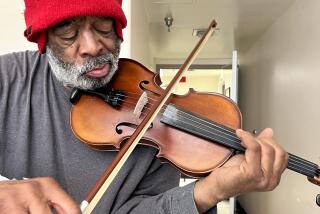Private ‘Sitters’ Fulfill Patients’ Needs Where Nursing Staff Can’t
- Share via
WASHINGTON — Jaromir Ledecky sits in Room 427 in Sibley Memorial Hospital. With him is Alexia James, who bathes him, helps him from the bed to the chair, takes his blood pressure. If anything goes wrong, she’s there to alert the nurse.
Ledecky, who is recovering from a leg operation, hired James, a certified nursing assistant, or “sitter,” at his own expense--as he did when he underwent a heart operation at Washington Hospital Center, and when he had surgery in Baltimore.
“I feel to improve the quality of care, the only thing I can do is to have somebody here 24 hours a day,” said Ledecky, 73, an economist. “I could not get the service I require from the hospital staff.”
It has come to this: Bring your own nurse. Even in the best hospitals, patients and their families are turning to private nursing help to supplement care from short-handed, overworked staffs. As hospital nurses focus their efforts on patients in crisis, private “sitters” are there to tend to patients’ more personal needs.
Proponents say it brings peace of mind, and can also be a hedge against substandard care. But it can also add thousands of dollars to hospital bills--and it’s usually not covered by insurance. Prices range from about $100 a shift for an aide to about $350 a shift for a registered nurse.
Nevertheless, an increasing number of middle-income families appear willing to pay.
“I tell all my family and friends, if they are going to the hospital, they should consider a private-duty nurse. And if that level is not needed, I’d say get a sitter,” said nurse Diana Mason, editor in chief of the American Journal of Nursing.
“When patients go to the medical floor, I advise a private-duty nurse,” said New York neurosurgeon Jamshid Ghajar, who treats people with serious head injuries. “The biggest effect on the patient is the nurse. If you have good nursing care, you have significantly better outcomes.”
Even Consumer Reports on Health, in an article headlined “Avoiding Hospital Blunders,” advises, “If you can afford it, consider hiring a private-duty nurse.”
*
There are no good statistics on the trend. But anecdotes from Alabama to Oregon suggest more patients are hiring private nurses or nursing assistants. Private agencies that supply nurse’s aides report a dramatic rise in requests from hospitalized patients in the last few years.
Sitters or certified nursing assistants do not give medications or insert IVs; rather, they provide the personal touch: helping a patient to the bathroom, delivering meals, holding hands with a frightened patient, keeping watch at night.
The growing use of sitters reflects the turmoil in health care during the 1990s. Hospitals are in a squeeze to provide more intensive care at less cost. Lower reimbursement rates from managed-care plans and government programs have pressured hospitals to cut expenses and trim staffs. Patients tend to be sicker and older. That leaves fewer nurses to deal with more needy patients and more complex therapies.
“What we’re talking about should be part of basic nursing care,” said Sue Karen Donaldson, dean of the Johns Hopkins University School of Nursing. “The fact of the matter is that [patients] aren’t getting it.”
Hospital nurses “want to relate to patients and their families,” she said. “When you pull nurses back from that, they lose a compassionate part of themselves. Nursing is so short-staffed, nurses can’t practice their profession.”
All this has led to an exodus of nurses from hospitals and the nursing field. Nurses under age 30 account for about 10% of the profession.
Sitters are especially recommended for certain kinds of patients, such as the elderly who are frail or disoriented. Or in certain circumstances, as when patients are just coming out of intensive care, where the nurse-patient ratio is 1-1, to the general medical floor, where there may be one nurse for four or even eight patients.
“Families want it,” said Sue Henderson, a nursing director at Washington Hospital Center, where she estimates that 10% of patients have sitters. “They don’t want to leave their moms and dads without someone.”
Joan Vincent, Sibley Memorial’s director of medical and surgical nursing education, said sitters are encouraged “if we think a patient is at risk of falling, if a patient is unsteady or might be confused.”
Some hospitals discourage the use of outside sitters as unnecessary and potential interference with the staff. Sitters or not, the hospital is responsible--and liable--for a patient’s care and safety.
Others have taken steps to help families find private nursing assistants and nurses who are treated as extended staff. “That’s very common,” said Karen Amann Talerico, a nurse researcher at Oregon Health Sciences University in Portland, who notes a marked increase in hospital sitters in the last few years. “Most hospitals are just coming up with training guidelines for these people.”
Families usually find sitters through the nursing office. At Northwestern Memorial Hospital in Chicago, for example, general instructions posted on the Internet tell consumers: “If you would like a private-duty nurse, please talk with your nurse, who can make arrangements for you. It is your responsibility to pay the private-duty nurse or agency directly.” This is generally the case unless a hospital deems the extra nursing help a medical necessity.
Nurses have traditionally been hospitals’ “safety sentinels,” notes Mary Foley, director of the American Nurses Assn. But she advises hospitalized patients, “Don’t assume that everything is going to be taken care of.”
According to an Institute of Medicine analysis, as many as 98,000 Americans may die each year of medical errors that occur in the hospital. Many are medication mistakes--the wrong drug, the wrong dosage.
“How do you not make errors?” asked Oregon’s Talerico. “What’s most important is the assessment--to look, touch, feel and see how the person is doing. If you don’t have the time to do that, then everything that happens isn’t going to be of high quality, particularly for the elderly.”
To some leaders in the nursing field, the bring-your-own-nurse trend is a flashing yellow light that signals basic problems in the way hospitals operate. There is general consensus among medical leaders that when you go to the hospital, you need an advocate--a relative or friend who can follow your care and watch out for errors. The private nurse or nurse’s aide can serve as a stand-in.
“You want your own advocate there all the time,” said David Lawrence, head of Kaiser Permanente health plans and member of the IOM committee on medical quality. “If there is no family member, you can hire a care management nurse to be there with you. Or a minister. You need an adult who is not going to be intimidated by the place.
“That will be necessary until we put in more systematic approaches that build in safety.”
One afternoon at Sibley Memorial, Ledecky--father of Jonathan Ledecky, co-owner of the Washington Capitals hockey team--felt dizzy and faint. Alexia James went immediately to the nurse, who called the doctor. Ledecky’s blood pressure had plummeted. He was put to bed with a drip in his arm. In a few hours, his blood pressure had recovered.
“That’s the advantage when you have somebody,” Ledecky said. “You don’t have to worry. Alexia is my voice out there in the nursing station.
“I don’t know what I would do if I couldn’t afford it--if my children couldn’t afford it,” Ledecky said.
“What do people do who don’t have resources?” asked his wife, Berta Ledecky. “Where are we going with health care [if] you can’t go into the hospital and count on the care?”






